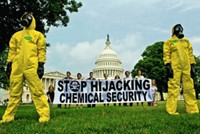Advertisement
Grab your lab coat. Let's get started
Welcome!
Welcome!
Create an account below to get 6 C&EN articles per month, receive newsletters and more - all free.
It seems this is your first time logging in online. Please enter the following information to continue.
As an ACS member you automatically get access to this site. All we need is few more details to create your reading experience.
Not you? Sign in with a different account.
Not you? Sign in with a different account.
ERROR 1
ERROR 1
ERROR 2
ERROR 2
ERROR 2
ERROR 2
ERROR 2
Password and Confirm password must match.
If you have an ACS member number, please enter it here so we can link this account to your membership. (optional)
ERROR 2
ACS values your privacy. By submitting your information, you are gaining access to C&EN and subscribing to our weekly newsletter. We use the information you provide to make your reading experience better, and we will never sell your data to third party members.
Safety
House Passes Chemical Security Measure
Safety: Bill requires separate standards for academic labs, large commercial facilities
by Glenn Hess
November 9, 2009
The House of Representatives passed legislation on Nov. 6 that would significantly expand the Department of Homeland Security's (DHS) authority to regulate security practices at thousands of facilities nationwide that produce, use, or store chemicals.
The Chemical & Water Security Act of 2009 (H.R. 2868) was approved by a vote of 230-193, mostly along party lines, with 21 Democrats joining Republicans in opposing the bill.
The legislation requires chemical-handling facilities to reduce the potential consequences of a terrorist attack by adopting a so-called inherently safer technology (IST), such as switching to a less hazardous process or using different chemicals.
"In the wake of the September 11 attacks, security experts immediately identified the threat of an attack on a chemical facility as one of the greatest security vulnerabilities facing the nation," said Rep. Bennie Thompson (D-Miss.), chairman of the Homeland Security Committee and the bill's chief sponsor, in a statement following the vote.
"After four years of hard work, this Congress finally got the opportunity to consider and pass this landmark homeland security bill. We can now ensure that this vital industry, and the population that lives around these facilities, are secure," Thompson said.
During debate on the bill, the House agreed to add a provision directing DHS to establish separate standards and procedures for security vulnerability assessments and site security plans for covered chemical facilities that are also academic laboratories.
"As a scientist, I understand that there is a big difference between an academic laboratory, which contains relatively small amounts of chemicals for student use, and a commercial laboratory facility, which routinely has large amounts of chemicals on hand," said Rep. Bill Foster (D-Ill.), who offered the amendment.
"Universities do not have the need or the budget to implement the same security protocols as are required of commercial facilities, and I am pleased that my amendment was accepted so that academic institutions are able to implement security procedures that meet their needs but still keep our students and communities safe," said Foster, who is a former physicist.
The American Chemical Society and the American Council on Education were among the organizations that urged lawmakers to include a regulatory distinction between university laboratories and manufacturing sites.
"Regulations designed to apply to a giant chemical manufacturing facility, where you may have tens of thousands of gallons or pounds of a material, are ill-suited for a university, where you may have extremely small quantities and they might be distributed through 10 different buildings on the site," says Glenn Ruskin, director of ACS's Office of Public Affairs.
Chemical industry officials say they support DHS's current program for securing industry facilities, but contend that the addition of an IST mandate will have negative, unintended consequences, such as product shortages.
The bill also runs counter to a key DHS mandate, which is infrastructure protection, by seeking to reengineer chemical facility infrastructure rather than protect it, says William Allmond, vice president of government relations at the Society of Chemical Manufacturers & Affiliates (SOCMA), which represents the batch, custom and specialty chemical industry.
The next step in the legislative process is for the bill to be considered by the Senate, but no action is expected until next year.




Join the conversation
Contact the reporter
Submit a Letter to the Editor for publication
Engage with us on Twitter